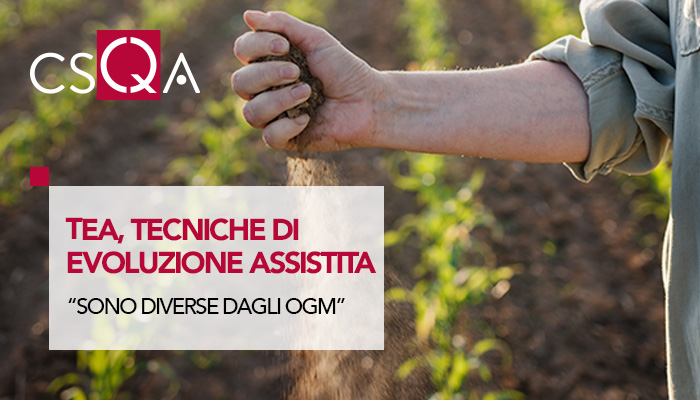
Assisted evolution techniques (TEA) are radically different from GMOs and require ad hoc legislation.
This is the request that the agri-food chain - from agriculture to industry - addresses to the European institutions, which will be asked to express an opinion in June , when the Commission plans to present a draft legislation in relation to Teas , those biological techniques developed over the last 10 years which allow to correct the DNA of plants and therefore to select specific characteristics useful for agriculture that would be difficult to obtain with other methods.
This is what we read in a note from Federalimentare jointly with CREA .
To promote a public-private system of genetic improvement based on the most advanced genomic technologies, representatives of the world of production, research and institutions met on March 14 in Rome."The big difference compared to transgenic GMOs is that the plants obtained with Tea do not contain the DNA of other organisms: the genetic heritage used is only that of the plants themselves", reads the note.
During the event the position paper "New genomic techniques genome editing and cisgenesis" was illustrated.
Developed by the National Agrifood Cluster, Crea and Federchimica Assobiotec, the document illustrates the potential of Teas within an Italian agricultural context increasingly put to the test by the effects of climate change and by the need to improve resistance to drought and adversity , and explains how these techniques can help increase the sustainability of our agriculture and produce healthier foods.
Some suggestions to politicians have thus been drawn up so that Italy can seize the opportunities linked to teas:
- allow field testing of teas in a short time;
- relaunch a research program on clean biotechnologies for tomorrow's agriculture;
- prepare tools for the technological transfer of research results to the productive world, also involving private industries, in order to renew the varietal panorama and make it suitable for the new climatic scenario.
This work, however, has remained confined to laboratories until today.
The plants already selected with Teas and those that will be selected in the next few years constitute a great opportunity for Italian agriculture - just think of the losses caused by drought - provided however that there is the possibility of testing them in the field , an option currently precluded.
CREA coordinated Biotech, the most important public research project for the development of TEAs in agriculture, which came to an end on 28 February 2023, leading to important results that can be grouped into two broad categories:
- Edited or cisgenic plants capable of increasing crop sustainability through the reduction of phytosanitary treatments, such as tomato plants resistant to parasitic plants (but also to salt and water stress), downy mildew resistant basil, powdery mildew resistant durum wheat, downy mildew and powdery mildew resistant vines, as well as scab resistant apple trees. Plants with improved production, quality or nutritional characteristics such as barley and wheat modified to increase potential yield, citrus fruits enriched with antioxidant compounds and seedless; aubergines and seedless vines, tomatoes with higher nutritional value.
- Advanced knowledge and specialist skills in an innovative and emerging sector in the panorama of agricultural research, which places Italy in step with the other more advanced European countries. BIOTECH's activities have allowed a leap forward in the knowledge of the molecular basis of the characters at the basis of genetic improvement, opening the horizon to the selection of more sustainable plants and more suitable for the new climatic scenarios.
When there is the European go-ahead, therefore, we must be ready. In this perspective, moreover, a strong economic investment will be needed for research on TEA. Like CREA, in fact, thanks to the BIOTECH project, we have dozens of seedlings developed by our researchers and ready to be planted". So Stefano Vaccari, Director General of CREA. (Source: https://www.crea.gov.it /)